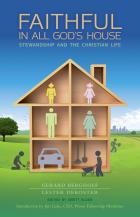Over at Think Christian, Aron Reppmann asks whether there is a distinctly Christian way to vacation: “We have learned to approach our work as vocation, a calling from God, but what about our leisure?”
Reppmann notes that one major temptation in modern society is to view vacation as a form of escape. Put in your 40, week after week, and hopefully, in Week X of Month Y, you’ll be able to leave your day-to-day activities behind. Close your eyes, sip your fruity drink, and let it all just slip away.
But escape from what? What does such a view indicate about how we’re approaching our daily work?
The word “vacation” itself doesn’t offer much help for this kind of reflection; with its echoes of “vacant” and “vacate,” it mostly conjures up a sense of absence. Vacationers commonly express a desire to “get away from it all,” but it’s hard to derive a positive sense of vacational vocation from that atmosphere of emptiness. While there’s nothing wrong with taking a break, stepping away – in a word, sabbath – there is also a trap in holding a merely negative definition of vacation…. Vacation understood simply as “getting away from it all” is a sign of a negative concept of freedom.
Reppmann goes on to argue that modern society over-elevates negative freedom — freedom from something — which has led many Christians to forget or ignore the positive freedom — freedom for something — that Christianity is all about.
This, he concludes, leads to an unfortunate imbalance in our thinking on work and leisure:
The Christian faith…offers a strong counterweight to our culture’s tendency to privilege negative freedom…Even Paul’s strong claim of “freedom from” — “For freedom Christ has set us free. Stand firm, therefore, and do not submit again to a yoke of slavery” — is closely followed by a reminder of the ultimate purpose of Christian liberty: “You were called to freedom, brothers and sisters; only do not use your freedom as an opportunity for self-indulgence, but through love become slaves to one another” (Galatians 5: 1, 13). Our “freedom from” is only worthwhile if it serves some good, to the glory of God.
In Faithful in All God’s House, Lester DeKoster and Gerard Berghoef define work as being “that which serves another,” and play as “that which serves ourselves.”
This isn’t to say that play is bad, but simply that the primary must remain primary. For indeed, play and rest serve purposes even as they relate to work itself (“recharge!” as they say). The danger is in how we order our lives and what or who we ultimately worship.
 On this, DeKoster and Berghoef offer a healthy way of looking at things:
On this, DeKoster and Berghoef offer a healthy way of looking at things:
Play may absorb much effort, long planning, and lots of time. But so long as the end in view is the satisfaction of the self, such effort cannot be called work. This is true whatever the form of play, whatever its esteem in the community as compared with work. What the self heaps up in time for its own use does not carry over into eternity, and burdens the soul that is thus occupied.
Play may be indulged as recreation, that is, as preparation for doing work better when the worker has been so refreshed.
You will know whether it is work, or play, which is occupying your time, your effort, and…your life. And knowing, you can yourself judge whether the time and effort you give to any activity is work, an investment in eternity, or play, and an investment in temporality.
We live in a society wherein “work hard, play harder” has become somewhat of a cliché. Early retirement is elevated as the ideal, with little more than a humid Florida golf course on the horizon. The self wants it, the culture promotes it, and our policies affirm it. Temporality abounds.
Yet this gets things terribly backwards. If work is, fundamentally, service to others and thus to God, let us pursue it and meditate on it and seek to participate in it for as long as we possibly can.
Let us rest when needed, certainly. But let us not set our sights on the prospect of running away.
—
For more, see Faithful in All God’s House: Stewardship and the Christian Life.
To join the On Call in Culture community, like us on Facebook or follow us on Twitter.

